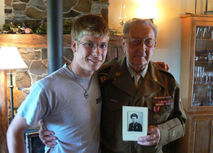What is Oral History?

When many people think about history, they think about dusty books and documents, archives and libraries, or remote castles and stately homes. In fact history is all around us, in our own families and communities, in the living memories and the experiences of older people. We need only to ask them and they can tell us enough stories to fill a library of books. This kind of history - that we all gather as we go through life - is called ORAL HISTORY.
Everyone has a story to tell about their life which is unique to them. Some people have been involved in momentous historical events like the Second World War. Regardless of age or importance, we all have interesting experiences to share. Most importantly, historical documents and books can't tell us everything about our past. Often they concentrate on famous people and big events, and tend to miss out on ordinary people talking about their personal experiences. Oral history fills in the gaps and gives us history which includes everyone. Unfortunately, because memories die when people do, if we don't record what people tell us, it is history that is lost forever. To this end, as a show of appreciation to the brave men and women who have fought to preserve our freedoms, each member of the junior class at Helix High School interviews a veteran and preserves the interview for future generations. Thank you to all the veterans for your many sacrifices...and your willingness to tell your story. |
How To Produce an Oral History Project
Step by step...here is how to produce a project that people will not only want to view, but will have historical significance.
STEP 1: Decide on who you want to interview and contact them
STEP 2: Prepare for your interview
STEP 3: Plan the questions
STEP 4: Take all of your equipment and go to the interview
STEP 5: Conduct the interview
STEP 6: After the interview, be sensitive to the feelings of the person you just interviewed (see guideline document) STEP 7: Download and edit your interview
STEP 8: Write a short summary of the veteran's military service (a few paragraphs for the website)
STEP 9: Submit all materials to Mr K. on your flash drive in a folder called "Your Name Oral History"
STEP 10: Thank the person you interviewed with a note and possibly a small gift. It might also be appreciated if you offered to provide them with a DVD copy of the interview. Here is the complete guidelines for the project
The National WWII Museum has another great guide for conducting an oral history project
| ||||||||||||||||||||||||||||||
